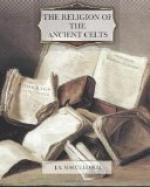In other ways myth told how the gifts of civilisation came from the gods’ world. When man came to domesticate animals, it was believed in course of time that the knowledge of domestication or, more usually, the animals themselves had come from the gods, only, in this case, the animals were of a magical, supernatural kind. Such a belief underlies the stories in which Cuchulainn steals cows from their divine owners. In other instances, heroes who obtain a wife from the sid-folk, obtain also cattle from the sid.[1293] As has been seen the swine given to Pryderi by Arawn, king of Annwfn, and hitherto unknown to man, are stolen from him by Gwydion, Pryderi being son of Pwyll, a temporary king of Annwfn, and in all probability both were lords of Elysium. The theft, in the original form of the myth, must thus have been from Elysium, though we have a hint in “The Spoils of Annwfn” that Gwydion (Gweir) was unsuccessful and was imprisoned in Annwfn, to which imprisonment the later blending of Annwfn with hell gave a doleful aspect.[1294] In a late Welsh MS., a white roebuck and a puppy (or, in the Triads, a bitch, a roebuck, and a lapwing) were stolen by Amaethon from Annwfn, and the story presents archaic features.[1295] In some of these tales the animals are transferred to earth by a divine or semi-divine being, in whom we may see an early Celtic culture-hero. The tales are attenuated forms of older myths which showed how all domestic animals were at first the property of the gods, and an echo of these is still heard in Maerchen describing the theft of cattle from fairyland. In the most primitive form of the tales the theft was doubtless from the underworld of gods of fertility, the place whither the dead went. But with the rise of myths telling of a distant Elysium, it was inevitable that some tales should connect the animals and the theft with that far-off land. So far as the Irish and Welsh tales are concerned, the thefts seem mainly to be from Elysium.[1296]
Love-making has a large place in the Elysium tales. Goddesses seek the love of mortals, and the mortal desires to visit Elysium because of their enticements. But the love-making of Elysium is “without sin, without crime,” and this phrase may perhaps suggest the existence of ritual sex-unions at stated times for magical influence upon the fertility of the earth, these unions not being regarded as immoral, even when they trespassed on customary tribal law. In some of the stories Elysium is composed of many islands, one of which is the “island of women."[1297] These women and their queen give their favours to Bran and his men or to Maelduin and his company. Similar “islands of women” occur in Maerchen, still current among Celtic peoples, and actual islands were or still are called by that name—Eigg and Groagez off the Breton coast.[1298] Similar islands of women are known to Chinese, Japanese, and Ainu folk-lore, to Greek mythology (Circe’s and Calypso’s




